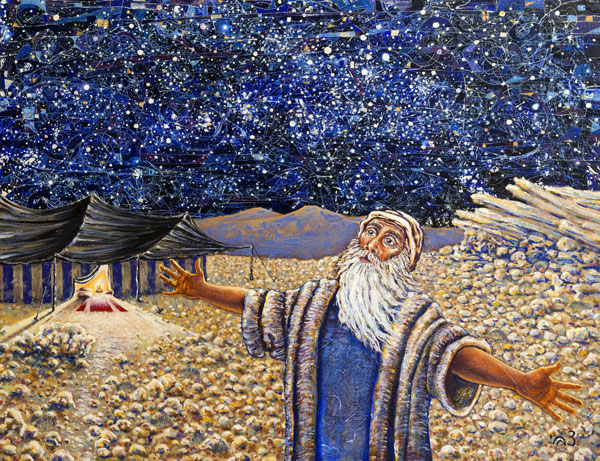The Covenant-making God invited Abraham and his family to take a journey to an unknown land. God promised to bless Abraham, make his name great, and bless the nations through him and his descendants. God made this promise even though Abraham and Sarah were rather old and still didn’t have any children of their own (Gen. 12:1-4).
Abraham’s story is a complicated one. It almost seems like a soap opera at times, but Abraham set out on the journey and God remained present throughout all the twists and turns of this journey. So, when Abram turned ninety-nine years old, God said to Abraham: “I am God Almighty, walk before me, and be blameless.” That is, “Live as if you were always in my presence.” [Goldingay, Genesis, 277]. When God made a covenant with Abram in Genesis 17, God promised to make his descendants “exceedingly numerous.” To symbolize this promise, God changed Abram’s name to Abraham, which means “ancestor of a multitude.” God also promised to bless Sarai with a son of her own. So God changed her name as well from Sarai to Sarah.
I find the story of Abraham and his family fascinating and informative. Not only is the story interesting on its own but it provides a foundation for our Christian identity. As Paul told the church in Rome, we share in the covenant God made with Abraham and Sarah by grace received through faith in Christ (Rom. 4:16-18). Therefore, not only do we share in the blessing of God’s covenant with Abraham and Sarah, but we are called to embody God’s blessings on the nations.
We share in this inheritance along with our Jewish and Muslim relatives. While we receive the blessing through Sarah’s son Isaac, Muslims share in the promise through Abraham’s son by Hagar, Ishmael. It is good to remember that when Abraham asked God about Ishmael, whom he loved, God told Abraham: “As for Ishmael, I have heeded you. I hereby bless him. I will make him fertile and exceedingly numerous” (Gen. 17:20). So, we share in the promises of the covenant that God made with Abraham along with our Jewish and Muslim relatives. We may have different mothers, but we have the same father. So, when Abraham died, his two sons gathered to bury him (Gen. 25:7-10). While their paths may have parted afterward, they carried with them the promise God made to Abraham, that through his descendants the nations would be blessed. As children of Abraham, we’ve been commissioned to carry this blessing into the world.
So, how might we, who have been adopted into the family of Abraham and Sarah, fit into the story? How might we be that blessing to the nations that God spoke of when calling Abraham to head out on a journey to an unknown land? As we take this covenant journey, what should our relationship with our relatives be?
Here is what Wil Gafney writes in response to these questions:
We don’t have to normalize patriarchy to draw wisdom from this text. This story is about the interrelation of the peoples in Israel’s world, their common origin from one family and God’s unmerited blessing on them independent of their own actions. We can begin to talk about blessing all of the peoples of the earth when we understand them to be equally blessed, Muslim, Jewish, Christian, and even those not on the radar of those composing this text. [Working Preacher, 2018].
As we contemplate Dr. Gafney’s words, I invite you to ponder the symbols representing the three Abrahamic religions that sit on the Lord’s Table this morning. These symbols remind us that when we come to the Table, we do so along with a rather large extended family. When we share this meal, we affirm the blessing that God has blessed us with.
When it comes to embodying the covenant promise made to Abraham, Hemchand Gossai offers this reminder:
Abraham’s role, like ours, is not to determine who is deserving or undeserving of a blessing, for indeed all of creation is blessed, and everyone wants to be blessed. One of the factors that must be reckoned with is that a blessing is not to be tightly held for the exclusive needs and benefits of oneself. [Barrenness and Blessing, p. 85].
How then might we embody this promised blessing in our daily lives? How might we share in living out this promise with our neighbors whose confessions of faith differ from our own?
Stepping out on this journey can be a bit scary. When we get involved in interfaith relationships, we might wonder how this affects our own confessions of faith in Jesus. I can only say this: my own faith journey has been enriched by my friendships with Jews, Muslims, Hindus, and the many other faith traditions I’ve encountered. I remain as committed today as ever to my faith in Jesus whom I confess to be the Word of God incarnate. Nevertheless, I’ve come to see that the Spirit of God is moving in places I might not have expected, bringing blessings to the nations.
During my thirteen years at Central Woodward, we have hosted and participated in numerous events that have brought together people of different faith traditions. We’ve co-hosted Iftar dinners during Ramadan and we joined with the Troy-area Interfaith Group in planting our Peace Pole. I hope and pray that as I depart in a few months, Central Woodward will continue to find ways of embodying this covenant promise God made with Abraham in your relationships with your neighbors, whether they’re Presbyterian or Muslim!
So “the God of Abraham praise. All praised be the Name, who was, and is, and is to be, is still the same; the one eternal God, ere all that now appears, the First, the Last, beyond all thought through timeless years!”
Preached by:
Dr. Robert D. Cornwall, Pastor
Central Woodward Christian Church (Disciples of Christ)
Troy, Michigan
Lent 2B
February 28, 2021

Comments